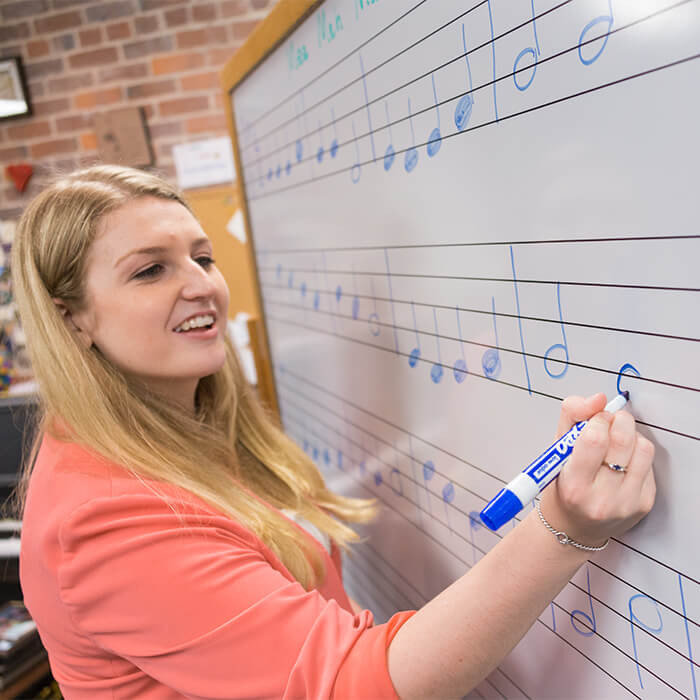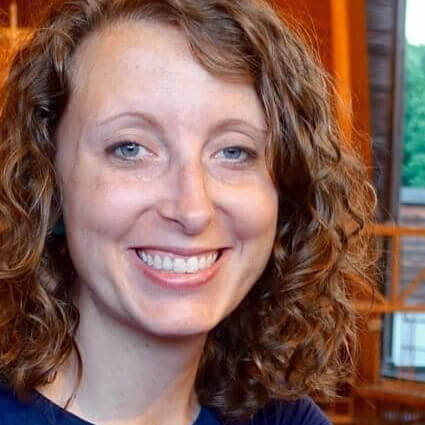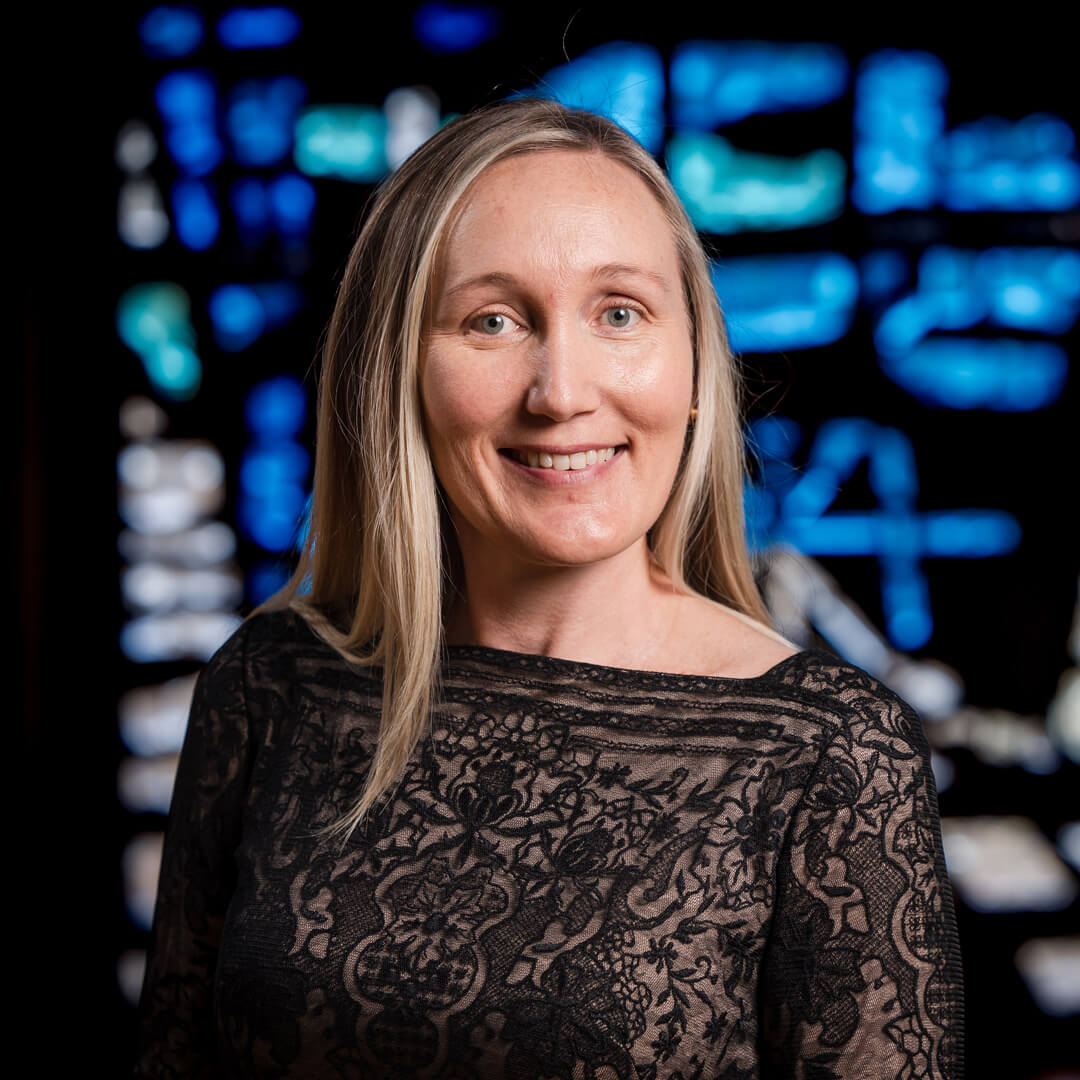Master of Music Education
The Master of Music Education (MME) program is intended for practicing music educators, and includes targeted study in pedagogy, scholarship and musicianship. The summers-only program is offered during four-week summer-intensive sessions and culminates with a research teaching project. Most students complete their course of study in three summers.

Workshop & Conference Credit
To register for credit for the event(s) listed below, please follow the directions to find, select the courses as described below. Make sure that the course number matches the workshop or conference you will attend (VMEA, ASTA, VKE). Also be sure to download the syllabus and complete the required assignments by the given due dates.
American String Teachers Association (ASTA)
January 4–19, 2024
Shenandoah University will offer graduate credit in conjunction with the American String Teachers Association. One credit may be earned at the graduate level. This credit may be used for certificate/licensure renewal or applied to degree programs. Shenandoah University is accredited by the Southern Association of Colleges and Schools.
American String Teachers Association (ASTA)
January 22 – April 26, 2024
Shenandoah University will offer one, two or three graduate credits in conjunction with the American String Teachers Association (ASTA). These credits may be used for certificate/licensure renewal or applied to degree programs. The purpose of the coursework is to provide students with the opportunity for research in reviewing a variety of articles from ASTA journals and performance and non-performance sessions in the online ASTA webinar library.
American String Teachers Association (ASTA)
March 20–23, 2024
Shenandoah University will offer one, two or three graduate credits in conjunction with the American String Teachers Association (ASTA). These credits may be used for certificate/licensure renewal or applied to degree programs. The purpose of the coursework is to provide students with the opportunity for reflection on ASTA national conferences sessions. Additional credits offer the opportunity for online webinar and research.
*Need help registering? View the Instant Enrollment documentation to get started. Contact Dr. Stephanie Standerfer via email at sstander@su.edu if you have any questions about registration or assignment.
2024 Summer Workshops

Everyone Belongs in Music: Fostering Creativity in the K-5 Classroom
June 21–22, 2024 | With Allison P. Kipp
Children are often transformed when they are able to express themselves in conjunction with opportunities for participation, creativity and skill building. Elementary music instruction provides a foundation for learning critical listening skills, sparks imaginations and provides an outlet for our students in which to communicate their own voice and choice. It’s a place where everyone can belong.
This hands-on workshop is designed to share innovative teaching strategies that promote creativity development and skill building in the K-5 music classroom —marrying these elements together for students. Participants will experience original music activities, movement games and dances connected to iconic recordings of yesterday and today (all accessible via streaming audio platforms). Additionally, participants will explore ways to foster belonging/community, advance life skills and strengthen the independent engagement of young artists. Handouts and playlists provided. Come on out to play!
Within this workshop, participants will explore:
- Innovative ways to use a variety of styles of music in the K-5 music classroom to build foster creativity development and musical skills;
- A set of original teaching strategies to implement in their teaching;
- A curated playlist of recordings and artists; and
- Authentic assessments embedded in best educational practices within the examples presented to assess individual and group music making (“take a solo” and group experiences).
About Allison P. Kipp
Allison P. Kipp received both a Bachelor of Music in Music Education and Master of Music Education from Shenandoah Conservatory of Shenandoah University. She is an experienced music educator, private voice/piano teacher, adjudicator, author, clinician and performer with 14+ years in the classroom.
Allison teaches at Legacy Elementary School in Loudoun County, Virginia, where she guides the musical lives of hundreds of children in grades K-5. At Legacy, Allison started a chorus program, bucket band, and a recycled instrument and found-sound orchestra.
Allison is co-author of “Jazz is Elementary: Creativity Development Through Music Activities, Movement Games and Dances,” for K-5 with Darla Hanley (Berklee Press/Hal Leonard). She is a member of NAfME, the Virginia Music Educators Association, the Jazz Education Network and Sigma Alpha Iota.
Allison has presented sessions at the Virginia Music Educators Association Conference (Richmond, Virginia), Massachusetts Music Educators Association Conference (Boston, Massachusetts), Jazz Education Network Conference (New Orleans, Louisiana), Loudoun County All-County Professional Development Day (Leesburg, Virginia), California State University (Northridge, California), Berklee College of Music (Boston, Massachusetts), and for the New York City Department of Education (New York, New York).

Revitalizing Your Conducting Gesture and Rehearsal Technique
June 24–25, 2024 | With Dr. Hillary Ridgley
Insights, review and renewal of conducting gesture and skills for church and public school choral and instrumental conductors/educators will be the focus of this workshop. Special attention will be given to strengthening and clarifying physical presentation, self-analysis, and matching gesture with the musical ideas embedded in the score. This workshop will also provide creative and practical rehearsal strategies to move beyond the notes and the rhythms and “bring the music to life.” Phrasing, articulation, rhythmic interest and text will be explored using the three main learning modalities: visual, aural and kinesthetic.

Developing a Community of Empowered Literate Musicians: Literacy through Literature
June 26–28, 2024 | With Dr. Hillary Ridgley
This workshop will present techniques that apply a Sound-Before-Symbol literacy approach (tonal, rhythm, melodic) to music literature. Participants will examine sequencing tonal and rhythm concepts, selecting repertoire to reinforce students’ previous knowledge and literacy skills, and the steps to determine ‘what’ they need to know to be successful on a particular piece. The implementation of tonal and rhythm literacy to repertoire via curriculum maps will also be explored.
Dr. Hillary Ridgley
Hillary Ridgley is assistant professor of music education at Shenandoah Conservatory of Shenandoah University. Ridgley holds a Ph.D. in choral conducting/music education from Florida State University. An active conductor, clinician and adjudicator, Ridgley most recently presented seminars in Mississippi, New York and Virginia, interest sessions at Eastern Divisional and Southern Divisional ACDAs, and conducted the Kentucky SSAA High School All-State Choir. Her research interests include choral text, the poetry of Sara Teasdale in choral music, music literacy, and community service partnerships and field experience for music therapy and choral music education students. Previously, she taught 12 years in the public schools.